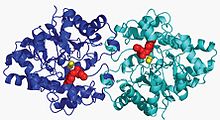- Aryldialkylphosphatase
-
aryldialkylphosphatase Identifiers EC number 3.1.8.1 CAS number 117698-12-1 Databases IntEnz IntEnz view BRENDA BRENDA entry ExPASy NiceZyme view KEGG KEGG entry MetaCyc metabolic pathway PRIAM profile PDB structures RCSB PDB PDBe PDBsum Gene Ontology AmiGO / EGO Search PMC articles PubMed articles Phosphotriesterase family 
Structure of organophosphorus hydrolase Identifiers Symbol PTE Pfam PF02126 InterPro IPR001559 PROSITE PDOC01026 SCOP 1dpm Available protein structures: Pfam structures PDB RCSB PDB; PDBe PDBsum structure summary Aryldialkylphosphatase (EC 3.1.8.1) (also known as organophosphoros hydrolase, phosphotriesterase, and paraoxon hydrolase) is an enzyme that hydrolyse organophosphates:
- an aryl dialkyl phosphate + H2O
 dialkyl phosphate + an aryl alcohol
dialkyl phosphate + an aryl alcohol
Thus, the two substrates of this enzyme are aryl dialkyl phosphate and H2O, whereas its two products are dialkyl phosphate and aryl alcohol.
An organophosphate is the general name for esters of phosphoric acid and is one of the organophosphorus compounds. They can be found as part of insecticides, herbicides, and nerve gases, amongst others. Some less-toxic organophosphates can be used as solvents, plasticizers, and EP additives.
Contents
Function
Bacteria such as Pseudomonas diminuta harbor a plasmid that carries the gene for aryldialkylphosphatase (EC 3.1.8.1). This enzyme has attracted interest because of its potential use in the detoxification of chemical waste and warfare agents and its ability to degrade agricultural pesticides such as parathion. It act specifically on synthetic organophosphate triesters and phosphorofluoridates. It does not seem to have a natural occurring substrate and may thus have optimally evolved for utilizing paraoxon.
Structure
Aryldialkylphosphatase belongs to a family[1][2] of enzymes that possess a binuclear zinc metal centre at their active site. The two zinc ions are coordinated by six different residues, six of which being histidines.
References
- ^ Scanlan TS, Reid RC (1995). "Evolution in action". Chem. Biol. 2 (2): 71–75. doi:10.1016/1074-5521(95)90278-3. PMID 9383406.
- ^ Fletterick RJ, Buchbinder JL, Stephenson RC, Dresser MJ, Pitera JW, Scanlan TS (1998). "Biochemical characterization and crystallographic structure of an Escherichia coli protein from the phosphotriesterase gene family". Biochemistry 37 (15): 5096–5106. doi:10.1021/bi971707. PMID 9548740.
Further reading
- Aldridge WN (1953). "Serum esterases. 1. Two types of esterase (A and B) hydrolysing p-nitrophenyl acetate, propionate and butyrate, and a method for their determination". Biochem. J. 53 (1): 110–7. PMC 1198110. PMID 13032041. http://www.pubmedcentral.nih.gov/articlerender.fcgi?tool=pmcentrez&artid=1198110.
- Bosmann HB (1972). "Membrane marker enzymes. Characterization of an arylesterase of guinea pig cerebral cortex utilizing p-nitrophenyl acetate as substrate". Biochim. Biophys. Acta. 276 (1): 180–91. PMID 5047702.
- Mackness MI, Thompson HM, Hardy AR, Walker CH (1987). "Distinction between 'A'-esterases and arylesterases. Implications for esterase classification". Biochem. J. 245 (1): 293–6. PMC 1148115. PMID 2822017. http://www.pubmedcentral.nih.gov/articlerender.fcgi?tool=pmcentrez&artid=1148115.
- Main AR (1960). "The differentiation of the A-type esterases in sheep serum". Biochem. J. 75: 188–195.
- UK, 1989.

This hydrolase article is a stub. You can help Wikipedia by expanding it. - an aryl dialkyl phosphate + H2O
